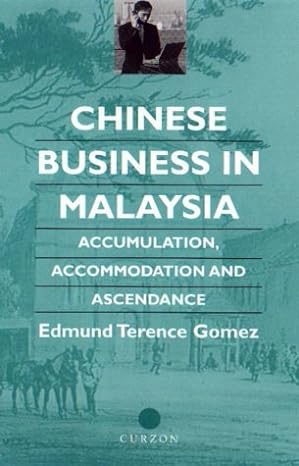
Exceptional political economists, the likes of which can zero in on corruption and insidious political practices, are hard to come by. Even if they exist, many have to write under a different name to avoid the possibility of a libelous lawsuit. The irony with Edmund Terence Gomez, certainly something Malaysian academia should be proud of, is his ability to get away from it all. His analysis is always spot-on, punchy, factual, well-sourced, and almost always bias-free. Indeed, since the 1980s, Edmund Terence Gomez has specialized in a genre that he literally created on his own: how do political parties and corporate cronies co-exist? Through it all, Edmund Terence Gomez has emerged from the whole process unscathed; even if the political personalities whom he took on range from the Finance Minister to the Prime Minister of Malaysia himself, this at a time when the Malaysian government under Tun Dr. Mahathir, was widely known for his infamous crackdown.
“Chinese Business in Malaysia: Accumulation, Accommodation and Ascendance,” is a work of another genre altogether. How do the ethnic Chinese companies in Malaysia survive, and thrive, sometimes under very stringent economic conditions? Be it the brief economic recession in 1984-1985, the Asian financial crisis in 1998 ormore recently in 2007, ethnic Malaysian Chinese companies have become the staple of Malaysian economy.
Working on the assumption that the Malaysian government is really not out to strangle Malaysian Chinese companies, in order to allow the Bumiputera ones to prevail, Edmund Terence Gomez was able to explain in vivid details how some ethnic Chinese companies have transformed themselves into exporting powerhouses. In other words, instead of operating mainly within the context of the Malaysian political economy, the ethnic Malaysian Chinese companies in the country, such as IOI, Genting, Hong Leong, Kerry Group and more, have embarked abroad. Be it ASEAN or even the US, these companies have a toe hold in foreign countries.
Hong Leong may not be in the gaming industry in Malaysia, for example. But Quek Leng Chan has more than sixty gaming licenses in United Kingdom alone. Kerry Group from Robert Kuok has a vast and extensive presence in Hong Kong. Genting Group works with native Americans in Connecticut, US, to help them run their casinos.
“Chinese Business in Malaysia,” may well be written as “Chinese Business in Malaysia and Beyond.” But Edmund Terence Gomez, being a very disciplined academician, focuses primarily on Malaysia, and by doing so, established himself once again as a master of a new genre. One can only hope that more students in Malaysia and Asia will study with him. Edmund Terence Gomez really has the knack to make complicated subjects extremely simple and easy to follow, a gift that some foreign universities in the US have begun to acknowledge, hence, his many foreign stints abroad. If he is the chancellor of University of Malaya, one cannot discount the possibility of this institution returning to the glory days of old, where the likes of Wang Gung Wu, Syed Hussein Al-atas and KS Jomo struck awe in the minds of other academics.
